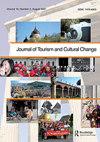Modelling pilgrim-tourist experience in Hindu religious destinations: an Interactive Qualitative Analysis
IF 2.5
4区 管理学
Q2 HOSPITALITY, LEISURE, SPORT & TOURISM
引用次数: 3
Abstract
ABSTRACT The study aims to shed new light on the key influencing factors and expected outcomes of the Hindu pilgrimage experience and develop a mental model for analysing the interrelationships among those factors. A robust methodology called Interactive Qualitative Analysis based on Systems Theory is used to understand the different aspects of such an interconnected system as pilgrimage involving multiple stakeholders. The destination popularity, safety, local culture, accessibility, hygiene, the timing of the visit, pilgrim turnout, and temple service pricing act as the significant drivers, whereas factors such as overall expenditure, destination hospitableness, spiritual ambience, hedonistic experience and holistic pilgrimage experience are identified as the outcomes. Identifying the underlying factors of Hindu pilgrimages in a culturally diverse context like India will aid the concerned temple management and policymakers in understanding and managing the key attributes catering to the various needs of diverse pilgrims. These are considered critical from a management point of view as they can be managed and facilitated by the policymakers and temple management, resulting in a conducive, peaceful and sustainable pilgrimage destination environment leading to overall pilgrim satisfaction and thereby having revisit intention and positive word of mouth.印度教宗教目的地朝圣游客体验建模:互动定性分析
摘要本研究旨在揭示印度教朝圣经历的关键影响因素和预期结果,并建立一个分析这些因素之间相互关系的心理模型。基于系统理论的交互式定性分析是一种稳健的方法,用于理解这种相互关联的系统的不同方面,如涉及多个利益相关者的朝圣。目的地的受欢迎程度、安全性、当地文化、可达性、卫生、参观时间、朝圣者人数和寺庙服务价格是重要的驱动因素,而整体支出、目的地的舒适度、精神氛围、享乐体验和整体朝圣体验等因素被确定为结果。在印度这样一个文化多样的背景下,识别印度教朝圣的潜在因素,将有助于相关寺庙管理和政策制定者理解和管理满足不同朝圣者各种需求的关键属性。从管理的角度来看,这些都被认为是至关重要的,因为决策者和寺庙管理层可以对其进行管理和促进,从而创造一个有利、和平和可持续的朝圣目的地环境,使朝圣者总体上感到满意,从而具有重访意向和积极的口碑。
本文章由计算机程序翻译,如有差异,请以英文原文为准。
求助全文
约1分钟内获得全文
求助全文
来源期刊

Journal of Tourism and Cultural Change
HOSPITALITY, LEISURE, SPORT & TOURISM-
CiteScore
5.10
自引率
9.10%
发文量
31
期刊介绍:
Journal of Tourism and Cultural Change ( JTCC ) is a peer-reviewed, transdisciplinary and transnational journal. It focuses on critically examining the relationships, tensions, representations, conflicts and possibilities that exist between tourism/travel and culture/cultures in an increasingly complex global context. JTCC provides a forum for debate against the backdrop of local, regional, national and transnational understandings of identity and difference. Economic restructuring, recognitions of the cultural dimension of biodiversity and sustainable development, contests regarding the positive and negative impact of patterns of tourist behaviour on cultural diversity, and transcultural strivings - all provide an important focus for JTCC . Global capitalism, in its myriad forms engages with multiple ''ways of being'', generating new relationships, re-evaluating existing, and challenging ways of knowing and being. Tourists and the tourism industry continue to find inventive ways to commodify, transform, present/re-present and consume material culture. JTCC seeks to widen and deepen understandings of such changing relationships and stimulate critical debate by: -Adopting a multidisciplinary approach -Encouraging deep and critical approaches to policy and practice -Embracing an inclusive definition of culture -Focusing on the concept, processes and meanings of change -Encouraging trans-national/transcultural perspectives
 求助内容:
求助内容: 应助结果提醒方式:
应助结果提醒方式:


